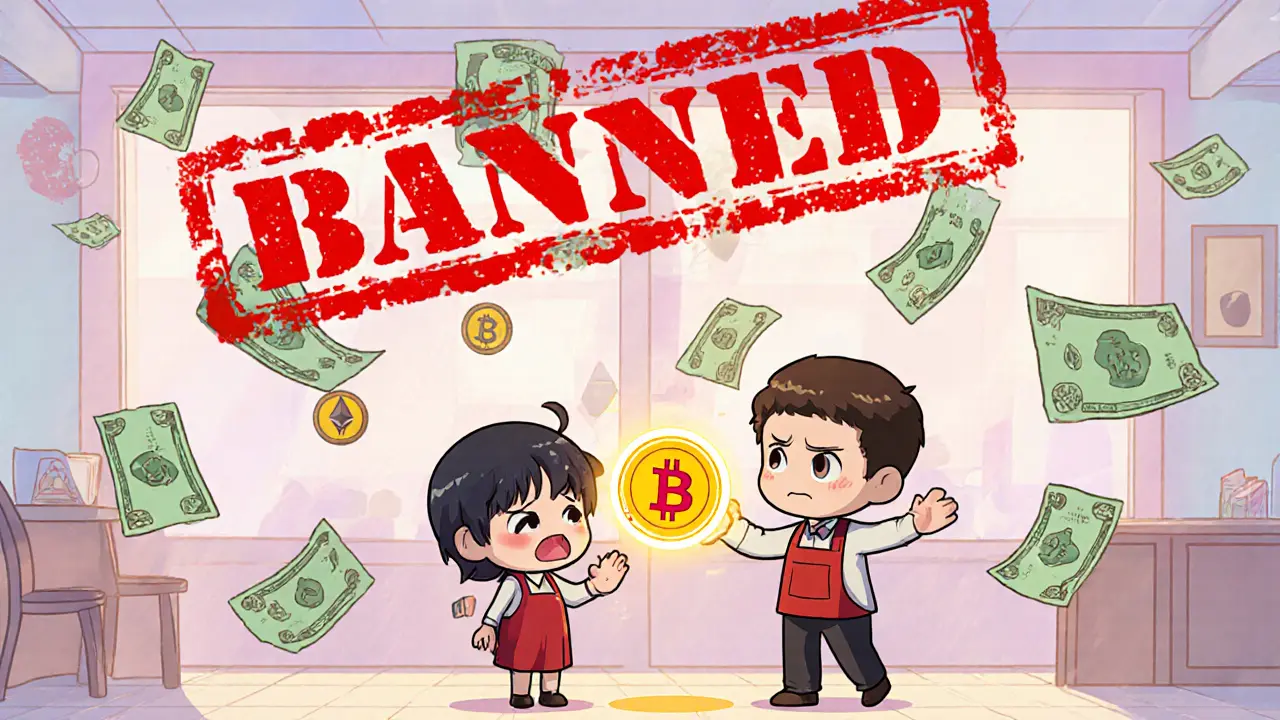Crypto Payment Impact Calculator
How Turkey's Crypto Payment Rules Affect Your Transactions
Transaction Analysis
Enter transaction details to see how Turkey's regulations apply.
On April 30, 2021, Turkey did something no other major economy had done: it made it illegal to use Bitcoin, Ethereum, or any other cryptocurrency to pay for coffee, groceries, or rent-while still letting people trade it freely. That’s not a typo. You could buy and sell crypto all day, but if you tried to use it at a local market, the shopkeeper could get fined. This wasn’t a crackdown on crypto itself. It was a targeted strike on its use as money.
Why Did Turkey Ban Crypto Payments?
The Central Bank of the Republic of Turkey (CBRT) laid out five clear reasons in their official announcement. First, cryptoassets have no central authority overseeing them. Unlike dollars or lira, no one is responsible if something goes wrong. Second, their prices swing wildly. One day, 1 BTC might buy a car. The next, it might not cover a meal. Third, they’re anonymous. That makes them perfect for money laundering, tax evasion, or funding illegal activity. Fourth, wallets can be stolen. If someone hacks your private key, there’s no customer service line to call. And fifth, crypto transactions are final. Once sent, they can’t be reversed-even if you were scammed.The CBRT didn’t want Turkish consumers losing life savings to volatility or fraud. They also feared crypto could destabilize the Turkish lira, which was already under pressure from inflation. So they drew a line: trade all you want, but don’t use it to pay for anything.
What Exactly Is Banned? What’s Still Allowed?
The regulation is simple but sharp. Payment processors, banks, and electronic money issuers are banned from processing any transaction that involves crypto. That means no QR codes for Bitcoin at the bakery. No PayPal-style crypto checkout on Turkish e-commerce sites. No apps letting you pay your utility bill with Ethereum.But here’s the twist: you can still buy, sell, hold, and transfer crypto without breaking the law. Exchanges like Binance Turkey and Koinim are fully operational. You can trade BTC for USDT, swap ETH for SOL, or store your coins in a wallet. The ban only blocks payment use, not ownership.
This created a strange reality: Turkey became one of the world’s biggest crypto markets-not because people were using it to pay, but because they were using it to protect their savings. With inflation hitting 85% in 2022, many Turks turned to crypto as a hedge. By 2023, nearly 1 in 5 Turks (19.3%) owned or traded crypto, according to surveys cited by MiTrade. That’s more than in Germany, France, or Japan.
The 2024 Law That Changed Everything
The 2021 ban was just the start. In July 2024, Turkey passed a new law: the Amendments to the Capital Markets Law. This gave the Turkish Capital Markets Board (CMB) full control over crypto service providers. Now, every exchange, wallet provider, or custodian operating in Turkey must get a license.The requirements are strict. Crypto exchanges need at least TRY 150 million ($4.1 million) in capital. Custodians need TRY 500 million ($13.7 million). That’s not just a formality-it’s a filter. Many small platforms couldn’t meet the cost and shut down. In March 2025, the CMB blocked 46 platforms, including popular DeFi services like PancakeSwap, for operating without a license.
These licensed providers now have to follow strict rules: they must verify every user’s identity, track every transaction-even canceled ones-and flag any activity that looks suspicious. They’re also required to delay withdrawals for certain transactions and limit transfers of stablecoins like USDT to prevent sudden capital flight.
How the AML Rules Got Even Tighter
On December 25, 2024, Turkey published new anti-money laundering rules in the Official Gazette. They took effect on February 25, 2025. Now, if you send or receive more than 15,000 Turkish lira (about $425) in crypto, you must be verified. That’s lower than most countries. In the U.S., the threshold is $10,000. In the EU, it’s €1,000. Turkey’s rule hits everyday traders hard.Even more restrictive: if a transaction comes from an unregistered wallet address, it’s flagged as “risky.” The exchange can freeze it. If the sender’s details are incomplete, the transfer might be canceled. This targets decentralized wallets and peer-to-peer trades-exactly the kind of transactions that let people bypass traditional banking.
Businesses are feeling the pressure. Deloitte Turkey reported in January 2025 that exchanges have increased compliance staff by 30-40%. They now need teams just to monitor transaction patterns, review KYC documents, and file reports with MASAK, Turkey’s financial crimes unit.
Businesses Are Stuck in the Middle
For Turkish merchants, the ban is a nightmare. They can’t accept crypto, even if their customers want to pay with it. A tech startup in Istanbul might have clients in the U.S. who want to pay in USDC. The merchant can’t accept it. They’re forced to use slow, expensive bank transfers instead.According to a 2024 survey by TÜİK (Turkish Statistical Institute), only 2% of Turkish businesses accept crypto in any form. Compare that to Georgia, a neighboring country with no payment ban-14% of businesses there take crypto. Turkey’s rules are pushing innovation abroad.
Even crypto-friendly businesses have to build workarounds. Some use third-party services to convert crypto to lira instantly, then deposit the lira into their bank account. Others use peer-to-peer platforms like LocalBitcoins to cash out, but that’s risky and slow.

People Are Still Using Crypto-Just Not to Pay
Despite the ban, crypto usage in Turkey hasn’t dropped. It’s just changed shape. People aren’t buying groceries with Bitcoin. They’re buying Bitcoin to protect their income from inflation. They’re using crypto to send money to family abroad without paying high wire fees. They’re trading to make a profit.Reddit threads on r/CryptoTurkey are full of complaints like: “I can trade freely but can’t use my USDT to pay for dinner-that’s the Turkish crypto paradox.” Trustpilot reviews for Binance Turkey average 3.8/5, with users praising the platform’s speed but criticizing the payment restrictions. “Great for trading,” one user wrote in February 2025, “but useless for payments.”
That’s the core tension: Turkey wants to control financial risk but can’t stop people from using crypto. The market is now worth an estimated $170 billion, according to Finance Magnates. That’s bigger than the entire stock market of several European countries.
The Legal Challenge That Could Change It All
In May 2025, a landmark case will be heard in Ankara. Sima Baktaş, founding partner of Turkish law firm GlobalB, is suing to overturn the payment ban. Her argument? The ban is hurting innovation, not helping stability. She points to data showing a massive 11x increase in crypto users during 2021, and 12% growth by 2023. If people are already using crypto, why not regulate it properly instead of banning its use?Baktaş argues that lifting the ban would make payments faster, cheaper, and more transparent. It would attract blockchain startups to Turkey instead of driving them to Dubai or Singapore. She’s not asking for chaos-she wants licensing, KYC, and oversight. Just not a blanket ban on payments.
If she wins, Turkey could become the first country to legalize crypto payments after banning them. That would send shockwaves through global crypto policy.
Where Turkey Stands in the Global Crypto Landscape
Turkey’s approach is unique. China banned everything. El Salvador made Bitcoin legal tender. Turkey did neither. It’s more like Kazakhstan or Russia-restricting usage while letting the market exist under tight control.But Turkey’s market is far larger. Its population is over 85 million. Its inflation problem is acute. Its tech-savvy youth are among the most active in the world. That’s why the world is watching. If Turkey lifts the ban, other countries with high inflation-Argentina, Nigeria, Lebanon-might follow.
Right now, Turkey is walking a tightrope. On one side: financial stability. On the other: economic opportunity. The government is betting that control beats freedom. But the people are betting on freedom anyway.
Can I still buy Bitcoin in Turkey?
Yes. You can buy, sell, and hold Bitcoin and other cryptocurrencies through licensed exchanges like Binance Turkey, Koinim, and Paribu. The 2021 ban only blocks using crypto to pay for goods and services-it doesn’t stop trading or ownership.
Is it illegal to use crypto to pay for something in Turkey?
Yes. It’s illegal for businesses, payment processors, or banks to accept crypto as payment. This includes QR codes, crypto wallets, or any direct transfer. Violations can lead to fines or license revocation for the business.
What happens if I send more than 15,000 lira in crypto?
If you send or receive more than 15,000 Turkish lira (about $425) in crypto, you must complete full identity verification (KYC). Unverified transactions above this amount will be blocked. The system also flags transfers from unregistered wallets as risky and may freeze them.
Why did Turkey ban crypto payments but allow trading?
The Central Bank was worried about volatility, lack of oversight, fraud, and money laundering. They believed allowing crypto as payment could destabilize the lira and expose consumers to risk. But they didn’t want to ban crypto entirely because millions of Turks were already using it to protect savings from inflation. So they chose a middle path: control the payment side, let the trading side continue under regulation.
Are DeFi platforms like PancakeSwap allowed in Turkey?
No. As of March 2025, the Capital Markets Board blocked 46 DeFi platforms, including PancakeSwap, for operating without a license. Only licensed service providers can legally serve Turkish users. Unlicensed platforms are blocked by internet providers and financial institutions.
Will Turkey ever lift the crypto payment ban?
Possibly. A major legal challenge by law firm GlobalB is scheduled for May 28, 2025. If the court rules in favor of lifting the ban, Turkey could become the first country to reverse a crypto payment ban and replace it with a regulated system. Many experts believe the ban is outdated given how widespread crypto use has become.




andrew seeby
November 6, 2025 AT 04:42gerald buddiman
November 7, 2025 AT 21:10Arjun Ullas
November 8, 2025 AT 00:04Steven Lam
November 9, 2025 AT 02:20Noah Roelofsn
November 11, 2025 AT 02:04Sierra Rustami
November 11, 2025 AT 02:07Abelard Rocker
November 11, 2025 AT 04:02Hope Aubrey
November 12, 2025 AT 02:44Pranjali Dattatraya Upadhye
November 12, 2025 AT 14:20Kyung-Ran Koh
November 13, 2025 AT 08:51Missy Simpson
November 15, 2025 AT 00:42Meagan Wristen
November 16, 2025 AT 14:20Allison Doumith
November 16, 2025 AT 18:46Ryan McCarthy
November 18, 2025 AT 06:20Matthew Gonzalez
November 19, 2025 AT 08:58Christopher Evans
November 20, 2025 AT 01:41Alexa Huffman
November 20, 2025 AT 13:29Emily Unter King
November 22, 2025 AT 10:59Tara R
November 22, 2025 AT 13:36Glen Meyer
November 23, 2025 AT 15:07